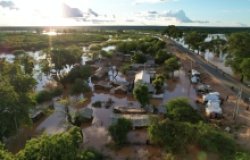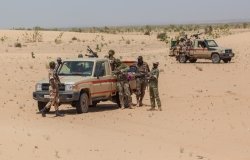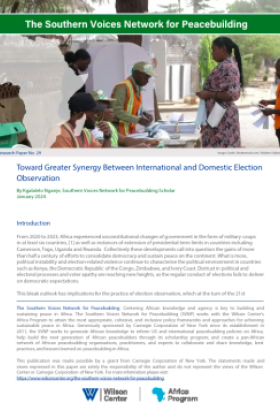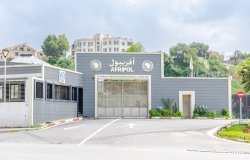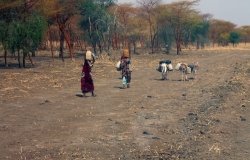Report on the Causes and Consequences of Sexual Violence Against Women and Girls in South Kivu, DRC
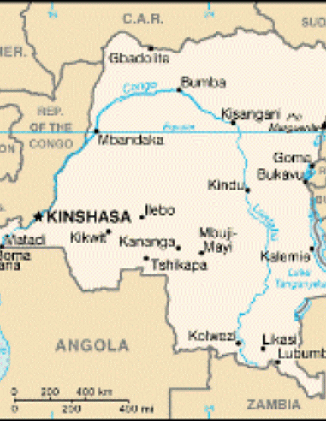

REPORT ON THE CAUSES AND CONSEQUENCES OF SEXUAL VIOLENCE AGAINST WOMEN AND GIRLS IN SOUTH KIVU, DEMOCRATIC REPUBLIC OF CONGO
PRELIMINARY FINDINGS
BACKGROUND, CONTEXT AND RATIONALE
Sexual violence against women and girls is one of the most horrifying aspects of the armed conflict that broke out in the eastern part of the Democratic Republic of Congo in 1996. All sides to the conflict have participated in these atrocities: militants from the Rassemblement Congolais pour la Démocratie (RCD), soldiers in the Rwandan and Burundian national armies, Mayi-Mayi and Interahamwe militias and Burundian rebels loyal to the Forces pour la Défense de la Démocratie (FDD) or to the Forces Nationales de Libération (FNL). During the conflict the incidence of these atrocities escalated to such an extent that local and international human rights organisations, as well as women's organisations working at the grassroots level, began referring to "a war within a war" and to a "war against women."
CURRENT CONTEXT
At the beginning of 2003, the United Nations Security Council condemned all forms of sexual violence against women during armed conflict as weapons of war. Despite the admirable political progress made in the DRC since the end of 2002, which includes the ratification of various peace agreements, the creation of a transitional government and the official reunification of the country, the security situation in the eastern part of the DRC still gives cause for concern, and sexual violence against women is still widespread.
ACTIONS AGAINST SEXUAL VIOLENCE FROM WOMEN IN DRC
Women in South Kivu have not only mobilised to condemn and eradicate violence against women and systematic violations of their human rights, but also to support women who have been subjected to sexual violence. In Bukavu, a consultative meeting bringing together several local NGOs to discuss the issue culminated in the creation of a Coalition Against Sexual Violence (CASV) In Uvira, a number of women's refuges have been opened by women's associations providing material, psychological and medical support to women who have been raped. A growing number of victims have found the courage to speak openly about the inhumane treatment they have been subjected to, which has made it easier to care for them and establish the scale of the problem.
RATIONALE
This report has been commissioned by two women's organisations working in South Kivu; the Réseau des Femmes pour un Développement Associatif (RFDA) based in Uvira and the Réseau des Femmes pour la Défense des Droits et la Paix (RFDP) based in Bukavu. The two organisations noted that the few research studies relating to the problem of sexual violence against women in South Kivu have tended to focus on describing and condemning various forms of sexual violence and on violations of women's human rights. Given the scale of the problem, which has also been described as "murderous madness" by some observers, the two organisations identified a need to examine the reasons for these crimes, to identify and analyse their socio-cultural foundations and to highlight the factors and motives that drive belligerents to subject innocent civilians, particularly women and girls, to such atrocities. The research also looks at the consequences of these acts. This approach is intended to provide a fuller understanding of the problem and to facilitate the development of appropriate policies and strategies aimed at eliminating all forms of violence against women. The results of this research will be widely disseminated and used to launch an international advocacy programme targeting specialised agencies. International Alert has pledged to support both organisations in this regard.
THE AUTHORS
RFDA and RFDP have both developed programmes on the issue of sexual violence, working at a range of levels from the provision of care to advocacy at both national and international levels. Both organisations are in the process of creating databases chronicling women's human rights violations, and RFDA has opened several women's refuges in Uvira. RFDP, a founder member of the Coalition against Sexual Violence, is involved in advocacy activities targeting the United Nations, national institutions and local administrative authorities in order to guarantee the protection of vulnerable civilian populations in South Kivu. International Alert, an international NGO that works to build sustainable peace in countries and communities affected or threatened by violence has been working in the Great Lakes region since 1995 and has established a programme supporting women's organisations dedicated to building peace and the promotion of women's human rights.
This document presents the preliminary findings of a report due to be published in English and French in April 2004. For further information or to receive a copy, please contact Laura Hucks or see International Alert
RESEARCH ISSUES AND METHODOLOGY
The research was based on the following issues:
· What form does the sexual violence take against women and young girls in South Kivu?
· Are there ideological, political, psychological and socio-cultural reasons for the violence and sexual atrocities endured by women and young girls at the hands of warring factions in the DRC?
· What are the direct and indirect costs of these atrocities on the victims and their communities?
· Do strategies exist to help female victims, which the victims themselves, their communities and various support groups have used or recommended?
At the heart of this research are the victims of sexual violence; the way in which they perceive and analyse the situation they are in and the strategies that they have deployed to improve their lives. A total of 492 women and young girls between the ages of 12 and 86, with an average age of 32, participated voluntarily in the survey. They were interviewed by 12 investigators and 3 researchers in 23 focus groups, each consisting of 12 participants. 50 soldiers and 2 Mayi-Mayi rebels also participated in the survey. The research took place from 15 September to 15 December 2003. Three data collection techniques were used: one-on-one interviews, focus groups and a review of current literature.
Data collection took place in the following geographical areas:
· In the south of South Kivu: Uvira, the Ruzizi plain, Mboko, Baraka, Kazimia
· In the north of South Kivu: Bukavu, Walungu, Kabare, Kalehe, Shabunda
MAIN FINDINGS
1. THE MAIN VICTIMS OF VIOLENCE AND SEXUAL ATROCITIES COMMITTED BY ARMED GROUPS IN SOUTH KIVU ARE WOMEN BELONGING TO THE MOST DISADVANTAGED AND VULNERABLE SOCIAL GROUPS, I.E. UNEDUCATED, OF CHILDBEARING AGE
These atrocities were particularly targeted at: a) women farmers who are the main driving force behind the subsistence economy in the region (76% of the women who were interviewed are farmers) and b) women of childbearing age, although all age groups were subjected to various forms of sexual violence. Most of the women who were interviewed, i.e. 66%, were uneducated. Women with a primary school education represented only 15% of the entire sample whilst women with a secondary school and tertiary education represented 17.7% and 0.2% of the sample respectively. In total, uneducated women and those with a primary school education represented 81% of the sample.
The informants came from 19 different ethnic groups, representing the main ethnic groups in South Kivu Province. These groups can also be found in regions that are geographically close to Rwanda, which were occupied by troops loyal to the Rwandan Patriotic Army (RPA) and the RCD when the conflict began. Most of the women who had been raped were Bembe women who represented 37% of the entire sample. Bembe people share a common border with Burundi and Bembe women are therefore easy targets for armed groups from Burundi such as the FDD. Bashi women accounted for 26% of the sample, Balega women accounted for 12.4% of the sample, Havu women accounted for 9% of the sample and Fulira women accounted for 7% of the sample.
2. RAPES AND OTHER FORMS OF SEXUAL VIOLENCE ARE COMMITTED WITH UNPRECEDENTED VIOLENCE AND INCLUDE ACTS PARTICULARLY AIMED AT HUMILIATING AND DEGRADING VICTIMS
Most of the rapes described by those interviewed were committed in public places and in front of witnesses. Four types of rape were identified:
· One-on-one rape: committed by a single perpetrator on a single victim. 23.3% of the informants had been subjected to this type of rape
· Gang rape: committed by at least two perpetrators on the same victim, either one after the other or at the same time was experienced by 79% of the informants
· Forced rape between family members: where the perpetrators force members of the same family to have sexual relations with each other (a mother and son, a father and daughter, a brother and sister), or to participate in the gang rape of a family member who is more often than not a mother or a sister
· Rape in which objects are inserted into the victim's genitalia: 12.2% of the informants had experienced this type of rape. The objects used for this type of rape were mainly batons, bottles, green bananas, pestles covered in pepper and gun barrels.
Many rapes were accompanied by torture, especially if the victims resisted. Some victims were beaten, wounded with machetes or had their genitals mutilated or burnt. All the informants said that the way in which they had been raped was the most degrading experience of their lives. 70% of the victims asserted that the perpetrators behaved calmly and lucidly when they carried out the rapes, whilst 30% of the victims noticed that the perpetrators exhibited extreme agitation and irrational behaviour during the attacks.
3. THE INTERAHAMWE (RWANDAN HUTU MILITIAS) CONSTITUTE THE LARGEST GROUP OF PERPETRATORS
Most of the victims were able to identify their attackers by the grievances they expressed against them, the language they spoke and their accents. Some informants also mentioned their physical and morphological make-up. 27% of the victims thus claim to have been raped by the Interahamwe, followed by FDD combatants (26%), RCD combatants and Banyamulenge rebels (21%), Mayi-Mayi rebels (16%), unknown men in uniform (3%) and RPA soldiers (2%).
4. MOST RAPES ARE ACTS OF BOTH SOCIAL AND ECONOMIC VIOLENCE, WHICH ARE OFTEN PLANNED IN ADVANCE
Rape and pillage nearly always go hand in hand. According to the informants, rapes committed by the Interahamwe since 2000, especially near the Kahuzi-Biega National Park, in Kalehe and Izege, appear to have been planned and coordinated. Attackers descend on a community to rape and pillage before leaving with stolen goods (livestock, crops, cooking utensils, ploughs, etc.), sometimes forcing villagers to carry these for them. These attacks also provide an opportunity to kidnap young women who are used as sex slaves in camps set up by the attackers. 10% of the women who were interviewed suffered this fate. The attackers appear to be fully aware of women's productive and reproductive capacities and how they can benefit from them. Even the rape of a woman working alone in a field is systematically followed by the looting of agricultural produce and implements. Rape is therefore no longer just an act of social violence it has also become an act of economic violence.
5. THE SCALE, NATURE AND DEVASTATING CONSEQUENCES OF SEXUAL VIOLENCE ON WOMEN AND THEIR COMMUNITIES CONSTITUTE A SERIOUS PUBLIC HEALTH ISSUE
The rapes that women have endured have seriously affected their physical and mental health. Most of the informants, i.e. 91.5% of the sample, suffer from one or several rape-related illnesses. The list of these illnesses is long and some of them are particularly serious like vesico-vaginal and rectovaginal fistulas or uterine prolapse (in which the uterus prolapses into the vagina), which require surgical intervention. Another outcome is the transmission of sexually transmitted diseases, which can lead to sterility if they are not treated properly and in time. HIV/AIDS infection is also a grim reality, given that many armed forces in South Kivu are HIV positive.
70% of the women who were interviewed did not receive any medical treatment after being raped. Some of them did not want to go to a health centre, wary of publicising the fact that they had been raped. Others were unable to get treatment, because of the inaccessibility or absence of a health centre in their community. Furthermore, many hospitals and health centres in the rural areas have been completely ransacked and have had to close. Health professionals have quit their jobs because of the lack of security. The few health centres that are still open are not equipped to treat complicated cases and most victims do not have the financial means to go to a specialist health centre in the urban areas. They have therefore had to rely on traditional medicine and medicinal plants to heal themselves.
91% of the women interviewed also have behavioural problems (including permanent anxiety, shame and self-loathing, excessive sweating, insomnia, nightmares, memory loss and aggression). These problems are exacerbated by the ostracism faced by victims of sexual violence within their communities, especially when rape has resulted in pregnancy. Many women who have been raped leave their communities to seek refuge in places where they cannot be identified. In Bushwira/Kabare, for example, nearly all the women in this situation fled to Bukavu or Goma.
6. SEXUAL ATROCITIES CONTRIBUTE TO THE EROSION OF THE ECONOMIC AND SOCIAL FABRIC OF RURAL COMMUNITIES IN SOUTH KIVU
Women and young girls who have been subjected to acts of sexual violence constitute the main driving force behind the rural subsistence economy. They are also over-represented in community-based businesses supplying basic consumer goods and essential foodstuffs such as cassava, fish, vegetables, palm oil, salt and soap. Women play a major role in the preservation of local communities, which depend, to a large extent, on women's productive and reproductive work for their survival. The war and the sexual violence that they have endured as well as the lack of security have forced many women to flee their communities, which therefore lose productive members of society. Young girls and women who are abducted and confined in camps set up by combatants are rendered unproductive at a time when young and productive men have either been killed in combat or conscripted into rebel forces. Women farmers who remain in the community have problems cultivating their fields because their means of production (ploughs and other agricultural tools) have been pillaged and because they have been weakened by rape-related illnesses. Local business women increasingly shun the roads and local markets when it comes to selling their produce. This has deprived many rural communities of one of their main sources of essential supplies, which has led to cases of severe malnutrition.
7. THE REASONS BEHIND THESE EXTREME ACTS OF VIOLENCE ARE A MIXTURE OF IDEOLOGICAL, POLITICAL, PSYCHOLOGICAL AND SOCIO-CULTURAL ELEMENTS
Identifying the reasons behind these horrific acts of sexual violence – a main goal of the research process is not easy. The research is based on information and analysis provided by 492 informants, 50 soldiers and 2 Mayi-Mayi rebel fighters. It also examines the socio-cultural context and the status of women in South Kivu and in the sub-region, as acts of sexual violence can only be eradicated when social structures and practices are taken into account. South Kivu, like the rest of the DRC, is a patriarchal and hierarchical society in which women still occupy a subordinate position. Some discriminatory traditional practices, which turn women into the personal and collective property of their menfolk, are still widespread. These institutionalised practices could explain certain aspects of the combatants' behaviour. Congolese legislation relating to rape is quite ambiguous and sometimes a legal loophole exists between the definition of rape and the definition of an assault on a woman's honour.
The analysis provided by women who endured sexual violence varies. Some informants believed that these acts of sexual violence fulfilled the combatants' need to satisfy their sexual urges. Taking this argument a step further, other informants maintained that sexual violence against women was a deliberate attempt to humiliate the Congolese people and to humiliate the whole country, which is coveted by its neighbours for its immense wealth. More than 50% of the victims firmly believed that the DRC's neighbours were engaged in a plot to exterminate the Congolese people. Combatants therefore used women's bodies and their reproductive capabilities to spread the HIV/AIDS virus and to create non-Congolese babies.
It is a commonly held view that rape increases an attacker's magical powers. Combatants believe that raping young women, young pygmy women and young virgins will make them invincible on the battlefield. However, most elderly women who are raped by the RCD and RPA are accused of being witches in the pay of the Mayi-Mayi. A commonly held view is that these elderly women safeguard the talismans, which give Mayi-Mayi rebels their power and invincibility on the battlefield. Raping these women not only dissipates the power of the talismans but also that of the Mayi-Mayi.
RECOMMENDATIONS
THE UNITED NATIONS SECURITY COUNCIL
· Ensure that Congolese women who have been subjected to rape and sexual violence receive compensation via the government of the DRC from the governments of aggressor countries that participated in Congo's war
· Make the demobilisation, disarmament, reinsertion and reintegration (DDRR) operation effective by taking serious and efficient measures to repatriate foreign militias in accordance with Chapter 7 of the United Nations Charter
· Launch immediately an independent international enquiry to determine individual and collective responsibility for acts of sexual violence against women
· Oversee the formation of a credible national army in the DRC by ensuring that fighting forces are restructured and reintegrated into the army in a rigorous and transparent way.
THE INTERNATIONAL COMMUNITY
· Ensure that financial support provided to the Congolese Government by the World Bank, the European Union and other international institutions takes into account the needs of Congolese women, in particular rural women, who are among the most disadvantaged and who constitute the social group most affected by sexual violence perpetrated during the war
· Provide long-term support to local organisations involved in monitoring and promoting women's rights in order to establish sustainable projects.
THE CONGOLESE GOVERNMENT
· Compensate women victims of sexual violence committed by Congolese fighting forces
· Strengthen national legislation relating to rape and sexual harassment
· Ensure that national reconstruction programmes prioritise the needs of rural women, in particular those who have been most affected by acts of sexual violence committed during the war.
About the Authors

Africa Program
The Africa Program works to address the most critical issues facing Africa and US-Africa relations, build mutually beneficial US-Africa relations, and enhance knowledge and understanding about Africa in the United States. The Program achieves its mission through in-depth research and analyses, public discussion, working groups, and briefings that bring together policymakers, practitioners, and subject matter experts to analyze and offer practical options for tackling key challenges in Africa and in US-Africa relations. Read more


